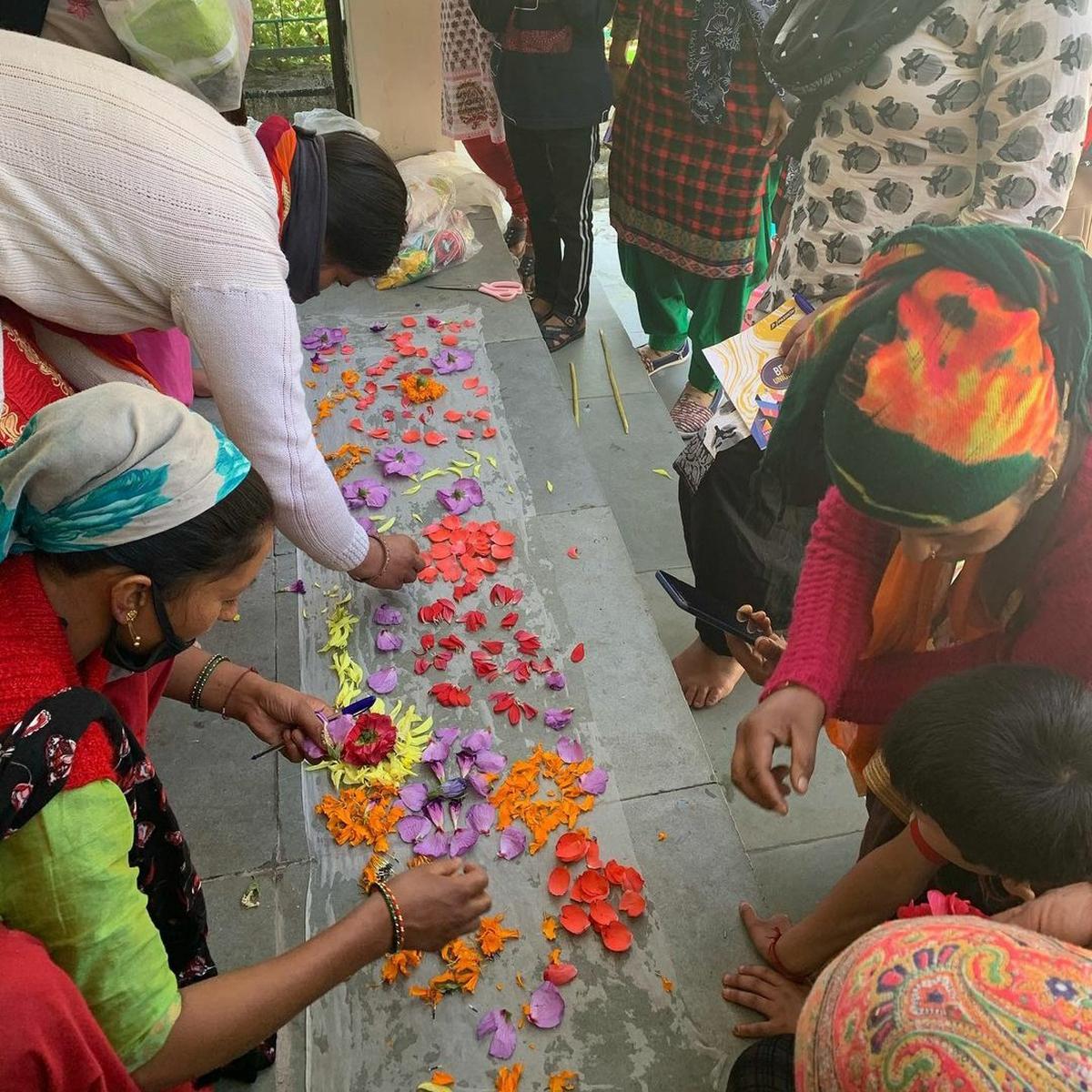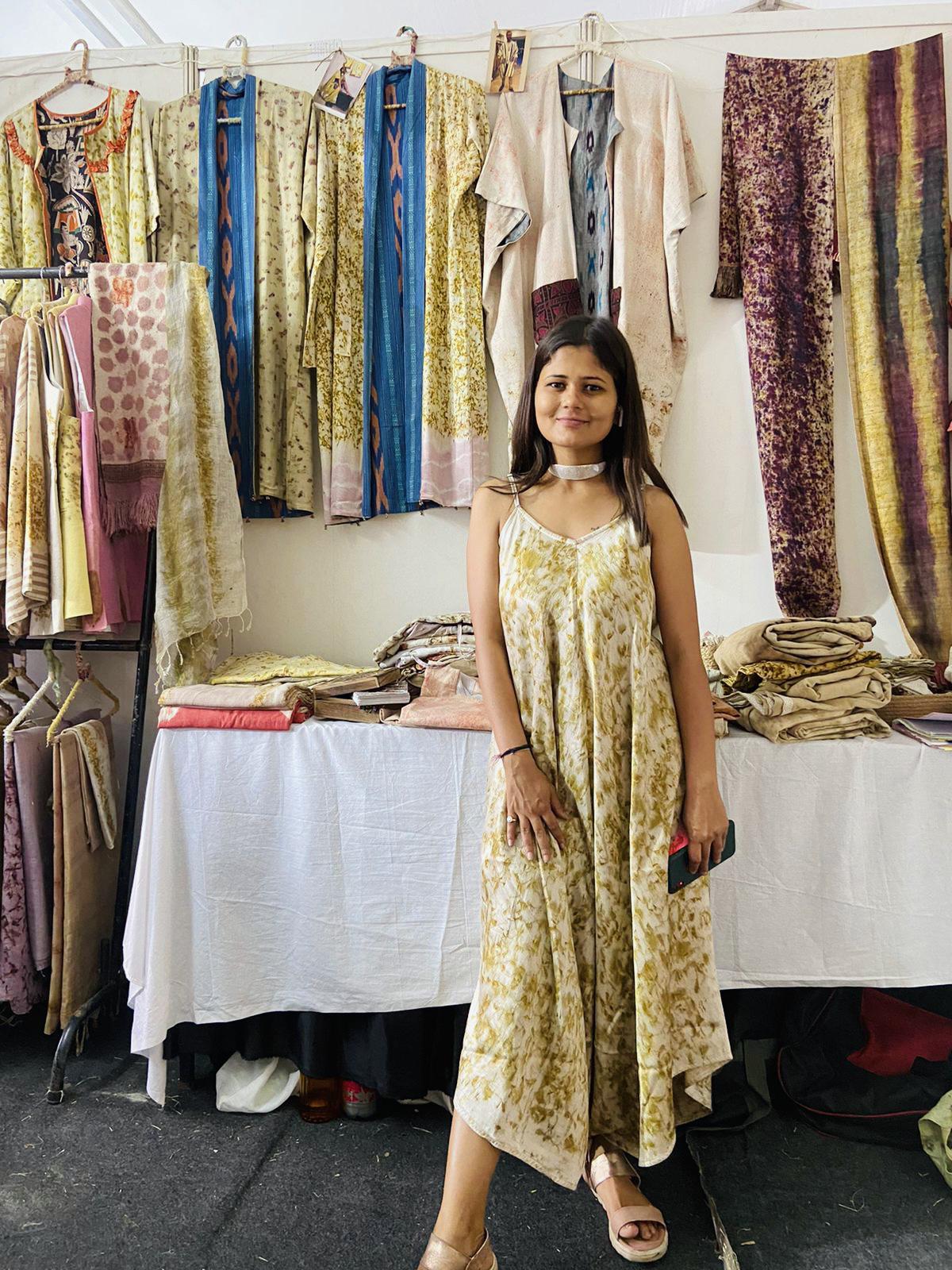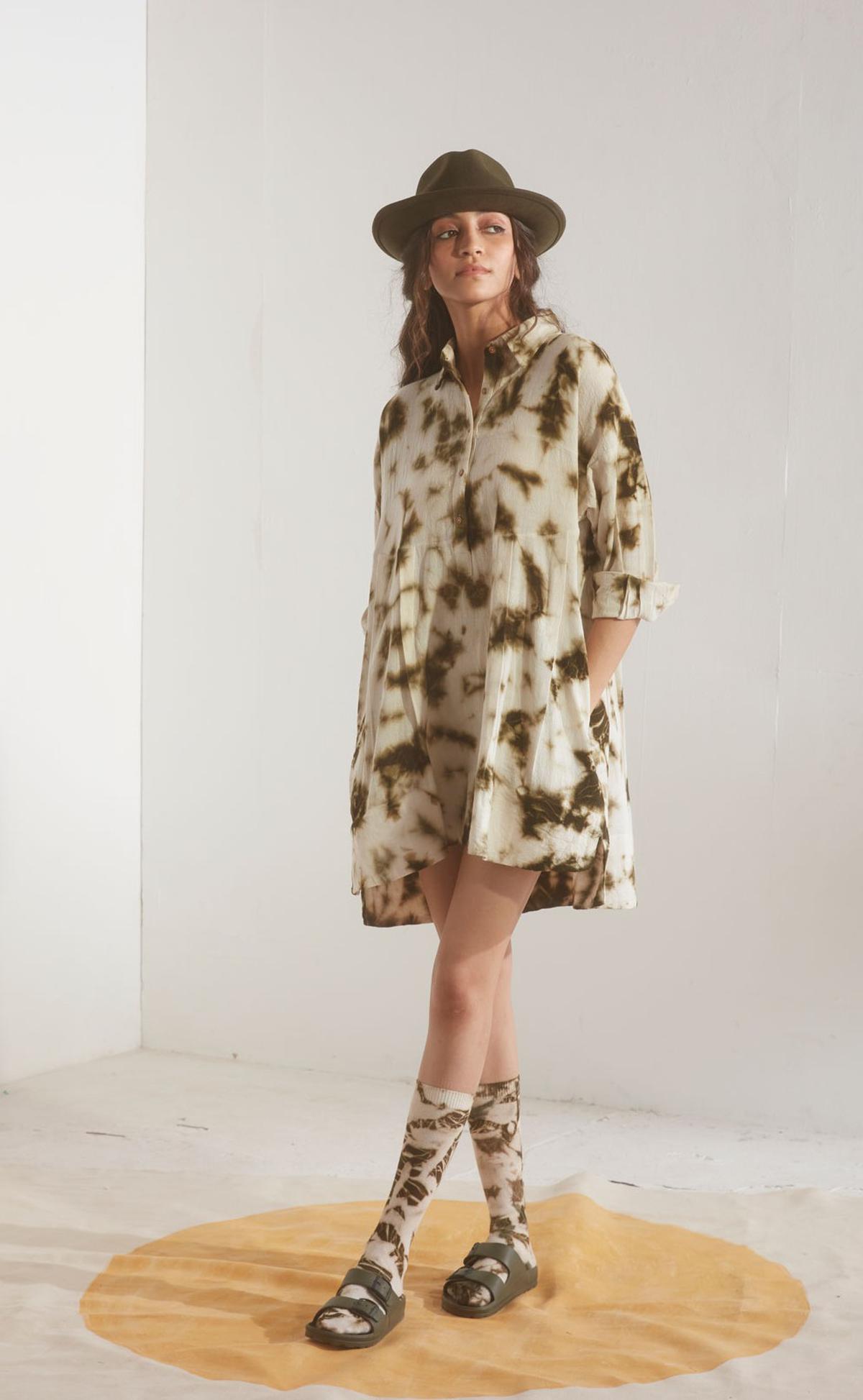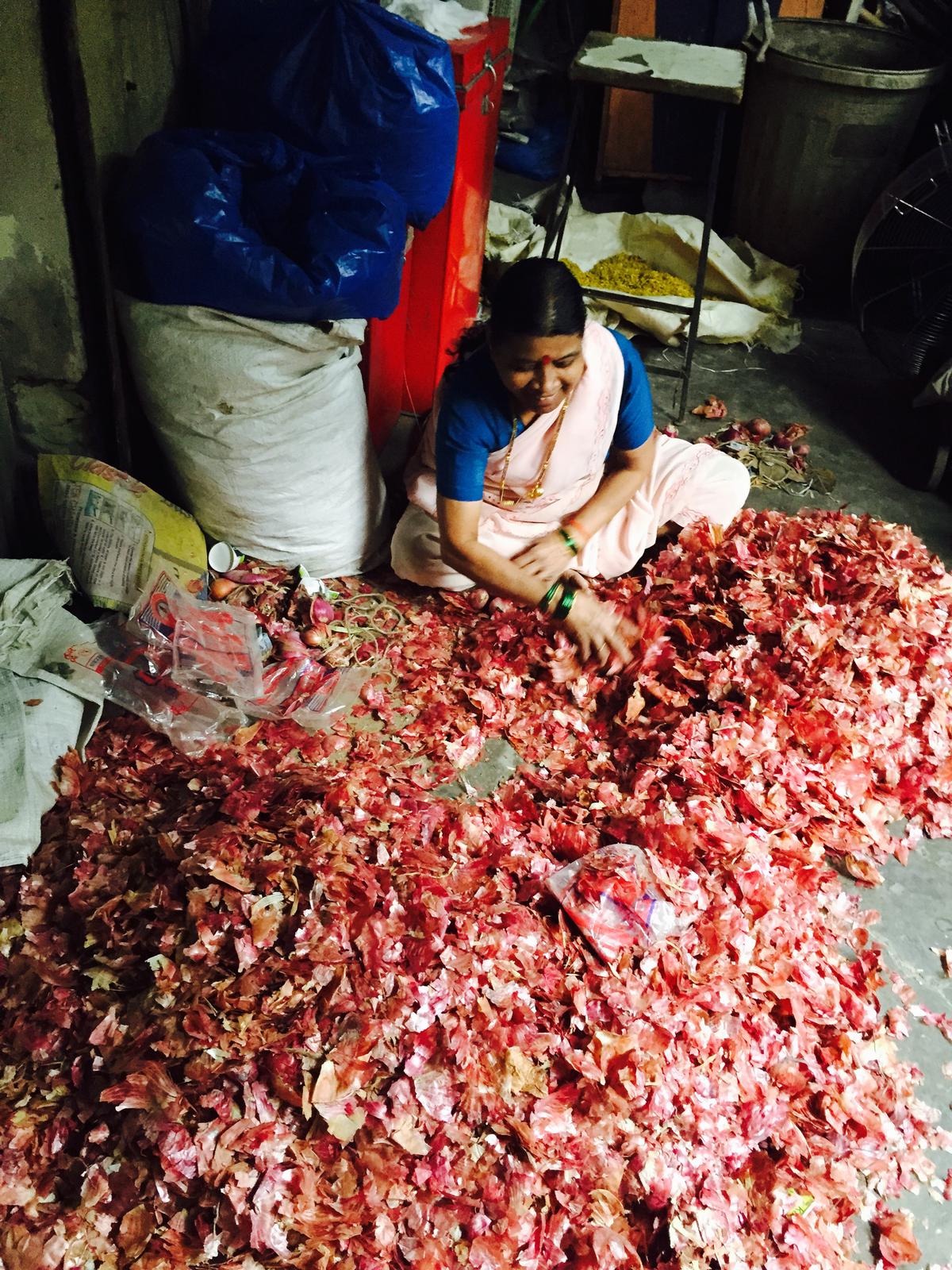Mulya, Uttarakhand
In August 2019, Alisha Maindoliya decided to quit her nine-to-six job in Jaipur and move back to her hometown Dehradun. The idea, she says, was to help others like her by creating job opportunities locally. A year later, she founded Mulya (meaning value in Hindi), which crafts hand-dyed, eco-printed apparel from waste flowers.
Flowers are collected from local temples, sorted, and then eco-printed onto fabrics. After collecting and segregating the flowers, the petals are placed on the mordanted and dyed fabric to create a pattern, which is steamed. “If not used immediately, petals are cut out and dried in the sun for later use. During eco-printing, the leftover residue is then utilised to create compost,” explains Alisha, who launched the Jaimala edition in 2021 to help people preserve memories through flowers. Mulya’s product line comprises apparel, woollens, and home furnishings such as curtains and pillows.
Alisha Maindoliya
| Photo Credit:
Special Arrangement
“We mostly work with protein and cellulose-based fibres such as cotton, linen, cotton silk, organza silk, and a few blended fabrics. These are outsourced from various suppliers across India, and locals are involved in collecting seasonal flowers, and embroidery,” says Alisha, 27, who also conducts a skill development programme for the workers.
She explains how clients can bring them flowers that hold value to them — from their wedding, a festival, or even their kitchen garden. “We encourage clients to their bouquets safe, and we use them to craft an accessory or garment.” Mulya collects flowers from all festive occasions, and people donate flowers from their Deepavali decorations and puja fowers, adds Alisha.

Women sorting flowers at Mulya’s facility
| Photo Credit:
Special Arrangement
With this specific flower project, Mulya has catered to more than 500 clients. “Stoles, scarves, and saris are just a few products we have produced for wedding favours. A particular client had gifts made for all the guests using flowers from the wedding. We embroider the name and details, turning each item into a souvenir,” says Alisha, who recently dropped her winter collection named Dunda Diaries comprising woollen stoles, scarves, sweaters, tie-up vests, among other apparel.
Upwards of ₹1,500 on @mulyacreation on Instagram
Bageeya, Gujarat
Detachable saris or dresses and reversible kimonos crafted in indigenous fabrics such as Chanderi and Maheshwari are not the only USP of Jigisha M Shukla’s brand. Since 2017, Jigisha has been recycling floral waste from temples to craft natural dyes at Bageeya. “Our printing material includes flowers collected from temples in Vadodara and ayurvedic herbs such as kattha, walnut hulls, harda, sappan wood that we source from Uttarakhand and parts of Delhi,” she says, adding, “We have worked with around 14 different Indian indigenous fabrics and have a bank of around 150 textures in 20 colour palettes.”
Ayurvedic herbs such as kattha, walnut hulls, harda, sappan wood are also used in Bageeya’s apparel
| Photo Credit:
Special Arrangement
This January, the brand received a patent for its innovative natural pigment “which helps us create 20 colours from three basic flowers that we get from temples: Roses, marigolds, and hibiscus”. Jigisha, who used flowers from the recent Ganesha Chaturthi celebrations, explains how she has collaborated with ethical event design companies such as Folk Finds and Genda Phool who help the brand with flowers used at their events. “We recycle them on fabrics and provide dyeing services on the client’s existing garment. We also have a recharge card wherein an existing customer can send us their worn Bageeya pieces for redyeing,” says Jigisha, who is now working on a soon-to-be-launched festive collection that champions handwoven zari, patchwork, and leftover eco-dyed fabric with golden thread work.
Upwards of ₹1,500 on @bageeya on Instagram

Jigisha M Shukla
| Photo Credit:
Special Arrangement
Adiv Pure Nature, Mumbai
Since 2008, Rupa Trivedi and her team at Adiv Pure Nature have been reviving the art of natural dyeing by hand. “Adiv is an innovative artisanal studio,” she explains, adding how the brand champions dyeing from “living colours” i.e. herbs and flowers. “We specialise in recycling flowers from temples, which forms our Temple Blessings programme. This project was born from a passionate desire to use the flower offerings that were traditionally tossed into the sea after being offered at temples,” says Rupa, who also works with discarded onion peels, and coconut shells.
She explains how the team started collecting small quantities of flowers from local temples and homes. As their capacity increased, Rupa reached out to Mumbai’s Siddhivinayak Temple, which sees a footfall of over four million devotees a month. “Every day, over 500 kilograms of flowers are offered at the temple. We collect these temple offerings thrice a week and receive roughly 40 to 80 kilograms daily. Our bags contain an assortment of marigolds, hibiscus, small quantities of rose and coconut husks.” Now, the brand has also roped in Mumbai’s iconic Peer Haji Ali Dargah from where they source red roses and white lilies.

Adiv Pure Nature specialises in recycling flowers from temples
| Photo Credit:
Special Arrangement
Once the segregated flowers reach the studio, Rupa explains that while some of the flower petals are used immediately to get bright yellow dyes, the rest are meticulously cleaned, plucked, and left in the shade to dry until they are devoid of moisture. “We then store them either as petals or in powder form,” she says, adding that her team comprises self-taught individuals, primarily women, whom she prefers calling “urban artisans”. “They have not only mastered the fine art of natural dying but have also reinvented many shibori (tie-dye) techniques.”
Having said that, working with fresh flowers is a challenge. “As all the flowers cannot be used in their fresh form, we have to shade dry and store them in airtight containers, either as dried petals or pulverise them into a powder. During monsoons, the high humidity and moisture content leads to flower decay, and drying them is tough as we do not use any machines.”

A women sorts flowers at Adiv Pure Nature’s unit
| Photo Credit:
Special Arrangement
These natural dyes then go on to be used on fabrics such as cotton, silks, etc. “Our specialty is eco-printing with flowers using shibori techniques. We often customise the textiles for international clients such as Johanna Riplinger (France), Anthropologie, Laura Siegel (USA), Globus (Switzerland), among others,” says Rupa, who has also collaborated on projects for American chef Alice Waters, architect Tadao Ando (Pulitzer Museum), etc.
Rupa says she is now working on a collection of wellness-inspired garments. “Apparel in handwoven fabrics such as organic cotton voile will be dyed in shades of yellow, green, rust, and orange. These dyes contain antimicrobial properties, and the pieces will be gender-neutral.”
Upwards of ₹2,500 onadivpurenature.com/
Akané, Mumbai
Last month, a couple approached Mumbai-based apparel brand Akané with an extraordinary request. Seeking to commemorate their wedding anniversary, the couple wanted to transform their cherished garland of roses from their wedding day into a custom set of silk pillowcases. Founded by sisters Janhavi and Juhi Vyas, Akané — the Japanese word for the madder root or manjishtha — is now known for breathing new life into flowers and garlands that would otherwise be trashed.
Fabric created using used flowers at Akane
| Photo Credit:
Special Arrangement
Janhavi explains how the brand is an offshoot of her graduation project at Bengaluru’s Srishti School of Art that focussed on natural dyeing. “The documentary, The True Cost, that looks at the fast fashion industry’s adverse environmental impacts also encouraged us to venture into slow fashion,” she says.
Today, the duo creates flowy dresses, scarves, activewear, and accessories such as cushion covers and pouches that draw from nature. Everything from flowers, roots, seeds, and leaves, go into their creations. Clients approach the brand with anywhere from 500 gram to a kilogram of flowers from weddings or intimate functions, and the sisters also collect flowers from temples and local flower markets in Mumbai’s Dadar.
“Last year, we received a custom order from a group of friends who sent a variety of carnations, red and pink roses. We used them to create a shirt, silk kimono, and three swatches made from the residual fabric to be framed,” explains Janhavi, adding that their next collection will feature organic cotton shirts dyed with locally foraged leaves such as eucalyptus, casuarina, and other materials including madder root, sappan wood, and marigold flowers.
Janhavi and Juhi Vyas
| Photo Credit:
Special Arrangement
Juhi explains how they commonly work with bright-hued flowers such as marigolds and roses. “While transporting them to the studio, factors such as humidity, and temperature need to be tracked. To ensure the flowers don’t wilt, the petals are delicately cleaned, air-dried, and frozen, preserving their natural colours and fragrances,” she says, adding, “Once they reach the studio, the petals are combined with water in vats, and heat is applied to encourage the release of pigments. The dyed water is then filtered to remove any impurities.”
In the next few months, the Vyas sisters hope to launch workshops to teach people the art of natural dyeing. ”In the petals and patterns of Akané’s collections, we find inspiration and a glimpse of what fashion could be a harmonious blend of art, tradition, and responsible practices,” concludes Janhavi.
Apparel upwards of ₹3,000 on akane-studio.com
With inputs from Esther Thomas
For all the latest Life Style News Click Here
For the latest news and updates, follow us on Google News.
